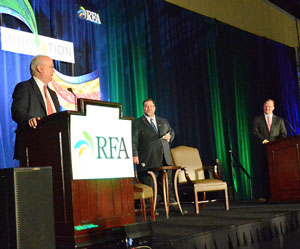Positioned on opposite sides of the stage to their political leanings, two former presidential advisors took on a range of questions related to the 2012 election year and important policy issues in front of 1200 attendees at the 17th annual National Ethanol Conference (NEC) last week.
 On the left, was senior advisor to President George W. Bush, Karl Rove, while on the right was the former White House Press Secretary for President Obama, Robert Gibbs. Serving as referee and moderator in the center was Renewable Fuels Association President and CEO Bob Dinneen. The two political insiders took on a variety of hot button topics, such as the contraceptive mandate and who will win the Republican nomination. While they disagreed on most matters, especially the contraceptive mandate, both seemed to agree that Mitt Romney will ultimately be the Republican nominee.
On the left, was senior advisor to President George W. Bush, Karl Rove, while on the right was the former White House Press Secretary for President Obama, Robert Gibbs. Serving as referee and moderator in the center was Renewable Fuels Association President and CEO Bob Dinneen. The two political insiders took on a variety of hot button topics, such as the contraceptive mandate and who will win the Republican nomination. While they disagreed on most matters, especially the contraceptive mandate, both seemed to agree that Mitt Romney will ultimately be the Republican nominee.
Energy policy was the main topic of interest for the NEC crowd and the mini-debate between Gibbs and Rove took place on the day that President Obama made a major speech about energy in Miami, just hours from where the ethanol conference was being held in Orlando. Gibbs stressed the president’s “all of the above” energy strategy. “We used less foreign oil last year than we have in 16 years. We have to re-double our commitment to renewable energy, be it wind, be it solar, be it renewable fuels – and I’m not just saying that because I happen to be talking to you all,” said Gibbs, adding that we also need to be utilizing more domestic oil, nuclear, natural gas and coal. “All this has to go into what we do to solve our energy crisis. There’s not a magic bullet.”
Rove did agree with Gibbs on the “all of the above” approach, but argued that the Obama administration was not doing as much as it could. “Robert’s right, we’re using less oil today, in part because you’re putting something into the oil so we don’t need to use as much of it. We peaked out, ironically enough, in our use of oil in this country in 2005 – the year of the RFS,” said Rove, who noted that he was disappointed that the ambitious schedule for getting cellulosic ethanol production on-line under the RFS has not been realized. “And that’s why what you’re doing in innovation is so important. If we’re going to realize the promise of the RFS, it’s going to take exactly that.”

